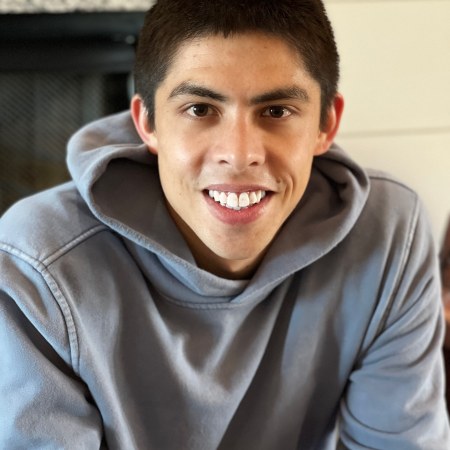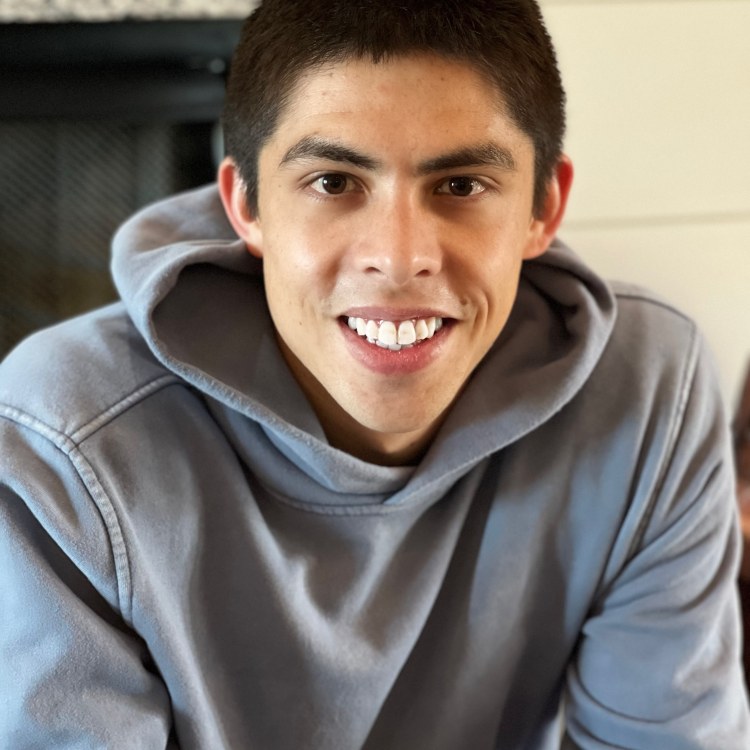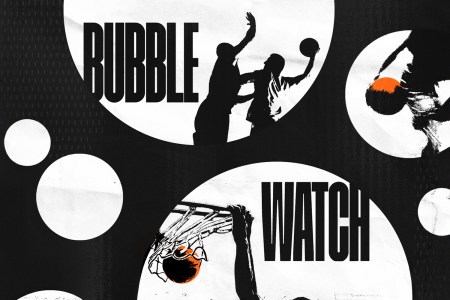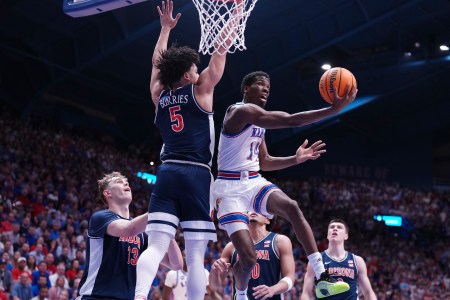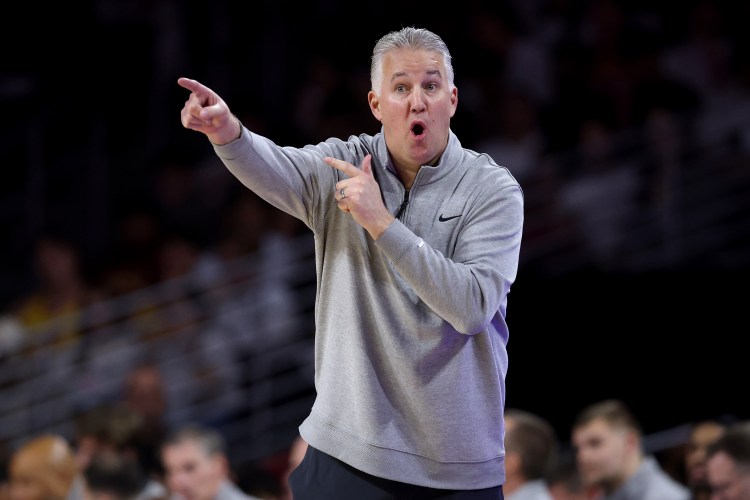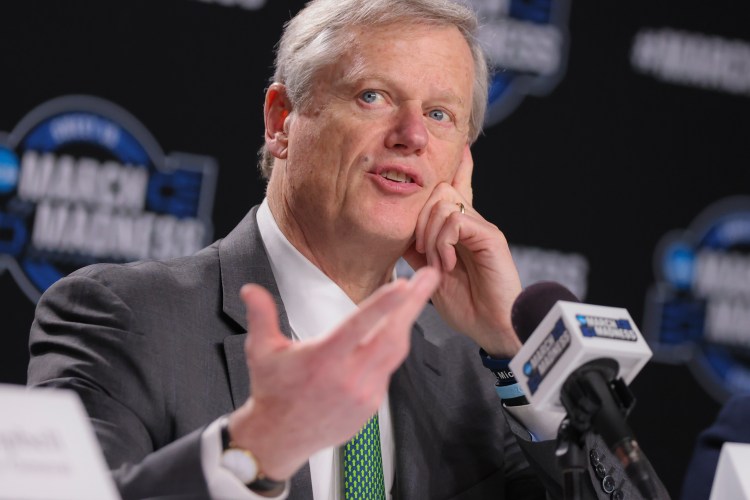During a Feast Week filled with shocking upsets, perhaps the most shocking of them all happened at Maples Pavilion last Saturday night, when Cal Poly toppled Stanford, 97-90, after a thrilling second-half comeback. Oh, you hadn’t heard? You’re not following the Mustangs? You should be. This team is playing a fast-paced and innovative style that is not just entertaining — it’s effective.
A month into the season, the San Luis Obispo-based school, renowned for its engineering and agriculture programs, is home to one of the best stories (and shows) in college basketball. New head coach Mike DeGeorge, who coached the previous six years at Division II Colorado Mesa University, has introduced an up-tempo style of play that is all about hunting efficient shots — mostly three-pointers and layups — before the defense can get fully set. Last season, DeGeorge’s squad led Division II in effective field goal percentage and was third in three-pointers made. Part of his philosophy was shaped by the famed run-and-gun system employed at Division III Grinnell College, where DeGeorge served as an assistant coach in 1999-2000. Grinnell utilizes a full-court press and shoots as many three-pointers as possible.
DeGeorge also encountered the Grinnell System as a player at Monmouth College in the early 1990s. “I played in that conference, and actually the first weekend they tried to do that, they did it against us,” he recalls. “It’s always been a really intriguing thing. I remember me and my teammates in college would debate frequently over those last couple of years when they were doing it, ‘Is there anything to the strategy?’ And a lot of my teammates were like, ‘Oh, it’s ridiculous, there’s no way it’s a winning strategy.’ And I’m like, ‘They may not have it all figured out, but there is something to it.’”
DeGeorge’s system at Cal Poly is decidedly different from that of Grinnell, but it certainly borrows concepts. (His son, Max, is currently playing for Grinnell.) As of this writing, Cal Poly is third in the country in adjusted tempo, per KenPom, and averages 28.6 three-point attempts per game, which ranks 43rd nationally. The Mustangs are off to a 5-5 start, already surpassing their win total from last year. They defeated Stanford for the first time since 1977 despite being a 15.5-point underdog. The victory was also the program’s first-ever over an ACC opponent. “When the game ended, I looked at my phone and I had 108 text messages,” says DeGeorge with a chuckle.
The ultimate underdog is in the hands of the ultimate rebuilder in DeGeorge, who was hired back in March. The veteran coach has been lifting programs out of the doldrums his entire career. “It’s more fun, quite frankly, to build [a program] than it is to sustain it,” he tells Hoops HQ. Well, then, it doesn’t get any more fun than this.

Along with assistant coaches Ron DuBois and Kyle Bossier, longtime members of his staff, DeGeorge developed his unique system with a heavy reliance on analytics. He also believes in positionless basketball — Cal Poly typically starts five guards, the tallest being 6-foot-7. The idea is that everyone on the floor is a threat to do everything, from attacking the basket and launching threes to setting screens and posting up. There are four main offensive principles the players must follow: always look to pass ahead, don’t hold the ball, make quick decisions and crash the glass.
“It feels kind of freeing, being able to be in any spot on the court and having any combination of players in the spots that we have,” says fifth-year guard Owen Koonce, the team’s leading scorer at 16.1 points per game. “And just knowing how to play out of that, knowing where to move the ball and where to cut and all these things. We have these rules, but we’re able to be creative out of those rules and concepts.”
Much like Drake coach Ben McCollum, who won four NCAA championships at Division II Northwest Missouri State, DeGeorge is proving that a guy who has had great success below Division I can also win with the big boys using the same style. Despite a disappointing 77-66 loss to UC Davis on Thursday night, in which the Mustangs were without two of their top three scorers (guards Isaac Jessup and Jarred Hyder) due to injury, Cal Poly is still first in the Big West in points per game (80.7). Last year’s team never scored more than 87 points in a contest. This year’s team has eclipsed that mark three times already, including in its win over Stanford, when it shot 20-of-28 from the floor and hit eight threes in the second half alone. Stanford head coach Kyle Smith called it “an offensive clinic.”
From Division II to Undefeated, Ben McCollum Is Making an Early Mark at Drake
McCollum won four Division II national championships. Now, he is making the most of his shot at the big time.
“They put you in a pickle,” Smith added. “Like NBA teams, their dribble drive, five out, spacing can put [your] guys in a pickle that we can’t even simulate. We don’t have our guys in practice really in those situations as much. We work on it a lot, but they’re very effective that way.”
One of DeGeorge’s favorite quotes is “expectations are the thief of joy,” which is partly why the Cal Poly job appealed to him. Expectations can’t get much lower than they were for the Mustangs. The team has suffered eleven straight losing seasons and is coming off an abysmal 4-28 (0-20 in the Big West) campaign. Four of the program’s newcomers — three of whom are in the starting lineup — are transfers from Colorado Mesa. The Mustangs finished last in the Big West in five of the past seven years and were picked to land there again in the 2024-25 preseason coaches’ poll. “On one level, it is exciting to have a new opportunity where there really aren’t any expectations,” says DeGeorge. “Every time we win here, people are over-the-moon excited.”
“It’s been fun to be the underdog,” adds Koonce, one of the transfers from Colorado Mesa. “It’s been a different mindset, just going out there having something to prove instead of something that someone could take away from you.”
DeGeorge has rebuilt several programs over his 31 years in the business. In his first head coaching role, he brought Division III Eureka College from a two-win program the year before he arrived to a team that won 17 games in his final season. He spent five years at Division III Cornell College, eventually guiding the program to its best record in school history (21-7). Under his leadership, the Rams won their only conference tournament championship in any men’s sport.
When DeGeorge was hired by Rhodes College in 2010, the Lynx had not posted a winning record since 2000. A couple years later, the team won its first conference championship in two decades. A couple years after that, it advanced to the DIII national tournament for the first time since 1993.
Then came Colorado Mesa, where DeGeorge worked his magic once again. In his first campaign, he steered the Mavericks to 19 wins, the same number they had earned in the two prior seasons combined. In 2020-21, Colorado Mesa earned its first-ever No. 1 national ranking and reached the Sweet 16 of the NCAA tournament. With DeGeorge at the helm, the Mavericks went 141-43 overall and claimed three regular season conference titles in six years.
According to DeGeorge, there is no secret blueprint to rebuilding. When he assumes control of a program, he does not clean house or hit the total reset button. Players on the roster are encouraged to stay and help contribute to the new direction. “My experience has been that when you inherit guys, they’re incredibly grateful for another opportunity and they really want to leave the place better than they found it,” DeGeorge explains. “And so they’re very invested in trying to help you do that.”
While he is not a loud coach, DeGeorge tries to be straightforward at all times with his players. He aims to establish “trusting relationships” by being forthright and not pulling any punches. He also holds his teams to a very high standard. “We want to pursue excellence,” he says. “We want guys who want to be good students and want to be the best versions of themselves on the floor and in the community.”
Of course, there are still many holes for Cal Poly to patch up. Rebounding has been an issue because the team is so undersized and the defense is among the worst in Division I, surrendering 81 points per contest. Even the offense can run more smoothly — and quickly — than it has. “I’m shocked we’re having as much success as we are, because we’re not executing very well yet,” DeGeorge says. “We got a whole ‘nother level to us once we start more consistently executing.”
The latest DeGeorge rebuild is in its very early stages. After losing to UC Davis, Cal Poly is still seeking its first conference regular season win since 2022. Its next chance will come against Cal State Northridge on Saturday night. In the meantime, expectations remain low for the Mustangs, but that’s okay. Expectations are the thief of joy and there has been quite a bit of that in San Luis Obispo thus far.
